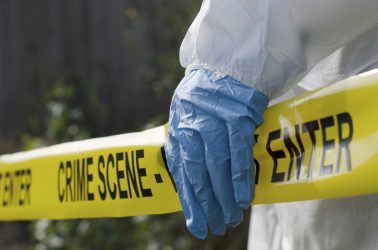Samantha Anderson is a fourth-year graduate student working toward a PhD in biochemistry at UW-Madison. She is passionate about her work on hydrogen bonding in membrane proteins, but she also knows that she wants to do more than contribute to the body of scientific knowledge in the traditional way.
“I love science, I love doing science, but I know I don’t want to sit at a bench forever,” says Anderson. Beyond the bench, she says, scientists affect and are affected by policy in both clear and nuanced ways, and becoming an effective part of the conversations around science and policy is an important responsibility.
That sense of responsibility has led Anderson – and many other young scientists like her – to a new and growing group on campus: Catalysts for Science Policy (CaSP). Established at UW-Madison in 2014, CaSP is an affiliate organization of the National Science Policy Group, a network of student groups across the country engaged in dialogue on science policy.
CaSP’s central goals revolve around science policy education for graduate students and postdoctoral researchers, promotion of policy career awareness and professional development opportunities, and communication of science to the non-scientist community, including government officials and agencies. In its first years, CaSP focused on building a critical mass of policy-interested young scientists at UW-Madison and offering opportunities to develop skills for engaging in policy discussions and pursuing policy careers.
Now, with a core group of active members and increasing interest across campus, CaSP is ready to become a more outward-facing organization focused on connecting with non-scientists and coalescing around specific issues of science policy. One of the first steps of CaSP’s evolution is its new association with the Wisconsin Institute for Discovery (WID), an interdisciplinary research institute at UW-Madison. For CaSP, WID provides an opportunity to amplify their message about the importance of science policy, engage with graduate students and postdoctoral researchers across a wide spectrum of disciplines and departments, and connect with WID’s ongoing outreach efforts.
WID also shares CaSP’s connection to policy: WID Director Jo Handelsman worked in the Obama Administration’s Office of Science and Technology Policy (OSTP) as the associate director for science before returning to UW-Madison to lead the institute.
“CaSP’s focus on generating debate and discussion about issues of science policy is exactly in line with the role WID aims to play in public discussion.”
– Jo Handelsman
“We are delighted to welcome CaSP to the WID community,” says Handelsman, who notes that CaSP’s mission fits with WID’s Illuminating Discovery Hub, which is dedicated to building a dialogue about science and technology within the campus and between the campus and citizens of the State and beyond. “CaSP’s focus on generating debate and discussion about issues of science policy is exactly in line with the role WID aims to play in public discussion.”
CaSP’s first event as a part of WID is also their first event focused on a particular issue of science policy. On Wednesday, October 4 at 4:00 pm in the H.F. DeLuca Forum at the Discovery Building, the group will host a panel discussion about improving forensic science policy.
“The problem with forensic science today is that a lot of the science behind it is not as validated as it should be,” says Jennifer Bratburd, who serves as CaSP’s Policy Engagement Coordinator. “Things like bite marks, latent fingerprints, ballistics. You might have someone saying this bite mark is a match and then you have another expert look at it and they’re not even sure it’s a bite mark.”
Bratburd points out that forensic science is not only a determining factor for guilt and innocence with profound impacts for the accused, it is also a public safety issue, particularly in cases of wrongful conviction. “You’ve closed the case on what might be faulty evidence, and you might have the real criminal still out there.”
“Law enforcement officials have obviously been doing the best that they can,” says CaSP co-president Carlton P. Frost, “but whether it’s because techniques differ or you have to go with the evidence that is available without necessarily having a great big validating dataset, not every tool in the tool belt stands up to the degree of scrutiny that would merit a peer publication.”
To discuss the intersection of science and justice, prevention of misapplications of forensic science in wrongful convictions, and the future of technology and methods to improve forensic science, CaSP has assembled a panel of experts from diverse backgrounds. The panel includes Justice Shirley Abrahamson of the Wisconsin Supreme Court, research botanist and co-instructor of forensic botany Alex Wiedenhoeft, cofounder of the Wisconsin Innocence Project Keith Findley, and assistant professor Kevin Ponto, who studies virtual reality – including the application of VR as a forensic tool – at the Wisconsin Institute for Discovery.
The panel presents a rare opportunity to hear perspectives from both law and science. The panel members each represent important fronts in the effort to improve forensic science. CaSP plans to follow up the panel event with additional events centered on forensic science policy, expanding the focus to include the social implications and perspectives from wrongly-convicted exonerees.
In addition to its focus on forensic science policy, CaSP remains committed to its mission of education, professional development, and science communication through a monthly series of events. In November the group will host events at the Wisconsin Science Festival and in February several members will travel to Austin, TX, for the annual meeting of the American Association for the Advancement of Science.
CaSP is still growing and evolving, but its members are confident that now, more than ever, it has an important role to play in the future of science and policy. Connect with Catalysts for Science Policy by email, on Facebook, and on Twitter.
Event: Improving Forensic Science Policy
Hosted by: UW-Madison Catalysts for Science Policy
Date/Time: Wednesday, October 4, 2017 at 4:00 pm
Location: H.F. DeLuca Forum, Discovery Building, 330 N Orchard St
– Nolan Lendved

